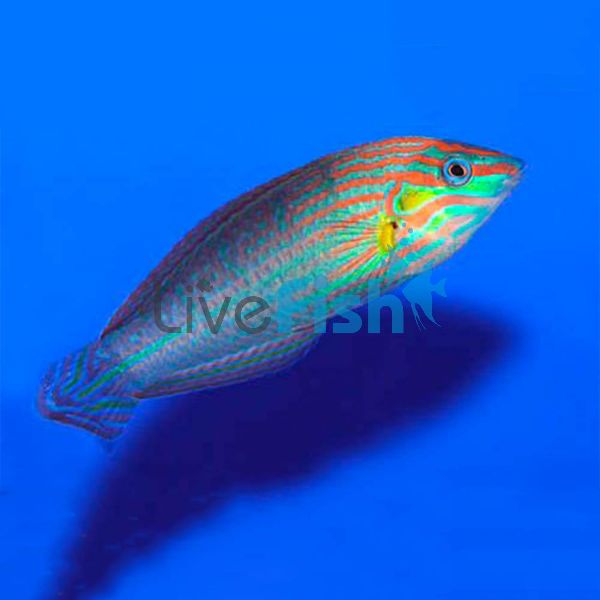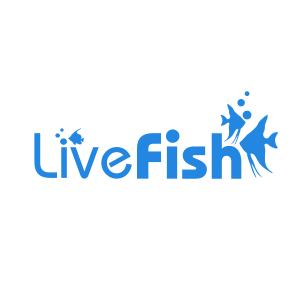Orange Tipped Rainbow Wrasse - Medium
This colourful and entertaining fish will keep you amused for hours while it darts around and buries itself in and out of the sand. An excellent beginner wrasse and a wonderful choice for your aquarium.
Orange Tipped Rainbow Wrasse
The Orange Tipped Rainbow Wrasse males have a mauve coloured body with pinkish-orange, yellow or blue wavy stripes and a yellow or green head. Equally impressive are the females who look similar but have a silver-blue body with only yellow stripes. They also have a black false eye located near the base of their tail.
In the wild, these fish will exist in a harem consisting of one male and multiple females. If the male dies for whatever reason then the strongest female will begin the transformation into a male which takes around two weeks.
This wrasse will be constantly on the move throughout the day but don't be surprised when it buries itself in the sand at the same time every night and gets a good night's rest. This is perfectly normal and it will be out and about early the next morning.
This species originates from all over the Western Pacific Ocean from the Great Barrier Reef and the Samoan Islands up to Southern Japan. They love hanging around rocky outcrops and coral reefs and have been seen at depths of up to 15 metres.
Tank Recommendations for Orange Tipped Rainbow Wrasse
The smallest tank size for this fish is 190 litres. It's extremely important that you provide a fine sand substrate of at least 4 inches (10 cm) in depth in which they can cover themselves for hiding and sleeping. It will probably spend the first few days of entering the tank buried like this until it feels comfortable enough to show itself. Wrasses are notorious jumpers so a well-fitting aquarium lid is essential. Provide some small pieces of rock that the wrasse will use when searching for food. They will do well in both fish only and reef environments but be aware that the constant nightly burying may cause instability in your coral structures.
Suitable Tank Buddies
The Orange Tipped Rainbow Wrasse has a peaceful nature and will do well with a variety of different fish species as long as caution is taken when selecting them. Multiple specimens can be kept together if added at the same time and if only one male is present, but be prepared for the eventual territory disputes over the first week or so.
Usually Compatible
Large Angelfish and Boxfish would be wonderful options to combine with this wrasse. Other great choices can include Damselfish and even Fancy Damselfish. Tangs would work really good together as well.
Sometime Compatible
Dwarf Angelfish, Blennies, Cardinalfish and Clownfish must be watched carefully. This is in case the wrasse eats all of their food before they have a chance to eat any. Same goes for other species such as Eels, Goatfish, Groupers and Grunts. Other fish species that could be tried if a close eye is kept on them are Parrotfish, Rays, Lionfish and Snappers.
Rarely Compatible
Batfish, Pipefish and Seahorses will probably starve to death in the presence of this wrasse. Larger predators such as Sharks will most likely see it as prey. Don't add in crustaceans and invertebrates either unless you are prepared for them to get picked at and maybe even eaten.
Feeding Your Orange Tipped Rainbow Wrasse
This species is carnivorous and has a voracious appetite. For this reason, they are often added to tanks to control coral pests and worm problems. It will readily accept most types of meaty foods. Ensure that you provide it with a good balance of different types such as brine and mysis shrimp, pieces of fresh seafood, frozen, flake and pellets foods. Feed them twice a day before all the other fish in the aquarium.
| Scientific Name | Halichoeres melanurus |
|---|---|
| Care Level | Easy |
| Common Names | The Orange Tipped Rainbow Wrasse is also known as the pinstripe wrasse and the tail-spot wrasse. |
| Diet | Carnivore |
| Fish Family | Pomacanthidae |
| Lifespan (years) | 5 |
| Max. Length (cm) | 15 |
| Min. Tank Volume (l) | 190 |
| Origin | Western Pacific |
| Reef Safe | With Caution |
| Sociability | Peaceful |
| Venomous | No |
| Water Conditions | 22.2-26.6° C (72-78° F), dKH 8-12, pH 8.1-8.4, sg 1.020-1.025 |




